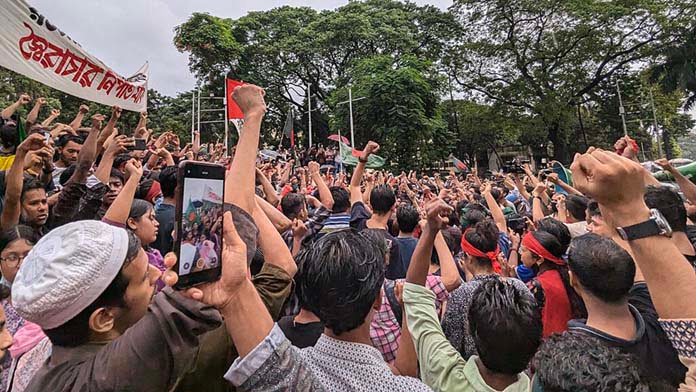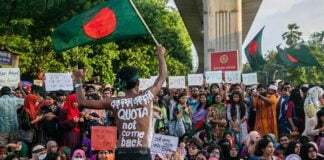Bangladesh’s authoritarian leader Sheikh Hasina has resigned and fled the country following weeks of mass student demonstrations.
A government crackdown resulting in at least 300 killed and the arrest of more than 10,000 people failed to crush the movement.
In January, Sheikh Hasina was elected for her fourth consecutive term as prime minister in an election widely condemned for corruption and fraud.
Official figures put voter turnout at 40 per cent, half the turnout at the last elections. This reflected widespread frustration with her Awami League’s authoritarianism, inflation and staggering rates of unemployment. In 2022, 40 per cent of Bangladeshis aged between 15-24 were out of work.
In June, this frustration was ignited over the allocation of jobs in the public service. Every year, 400,000 students compete for just 3000 jobs in the public service exam.
Since 1972, positions have been appointed through a quota system, which allocates 30 per cent of jobs to the descendants of veterans of the 1971 war of independence. This benefits supporters of the Awami League, which led the independence movement.
In 2018, mass student protests forced the government to halt the quota system. However, on 5 June, the High Court reinstated it, prompting students to take to the streets.
The government responded with force. On 15 July, police allowed the Bangladesh Chhatra League (BCL), the student wing of the Awami League, to attack student protesters at Dhaka University. The BCL operate as a paramilitary force, prepared to torture and kill opponents.
The next day, the government demanded that universities across Bangladesh close. The students responded by announcing that they would attempt the total shutdown of the country, blocking major roads and railways.
The government imposed a nationwide curfew and shut the country’s internet. Armoured personnel carriers were deployed in the streets and orders were given to shoot on sight.
Days later the country’s Supreme Court scrapped most of the quotas, leaving only 7 per cent of jobs reserved for war veterans’ families.
What started as protests against the allocation of government jobs has now toppled the government.
The army has installed an interim government and promised new elections. But in exchange it has called on student and opposition leaders to end the protests. Staying on the streets will be key to ensuring the end of authoritarian rule and addressing the poverty and inequality in Bangladesh.
By Jacob Starling




